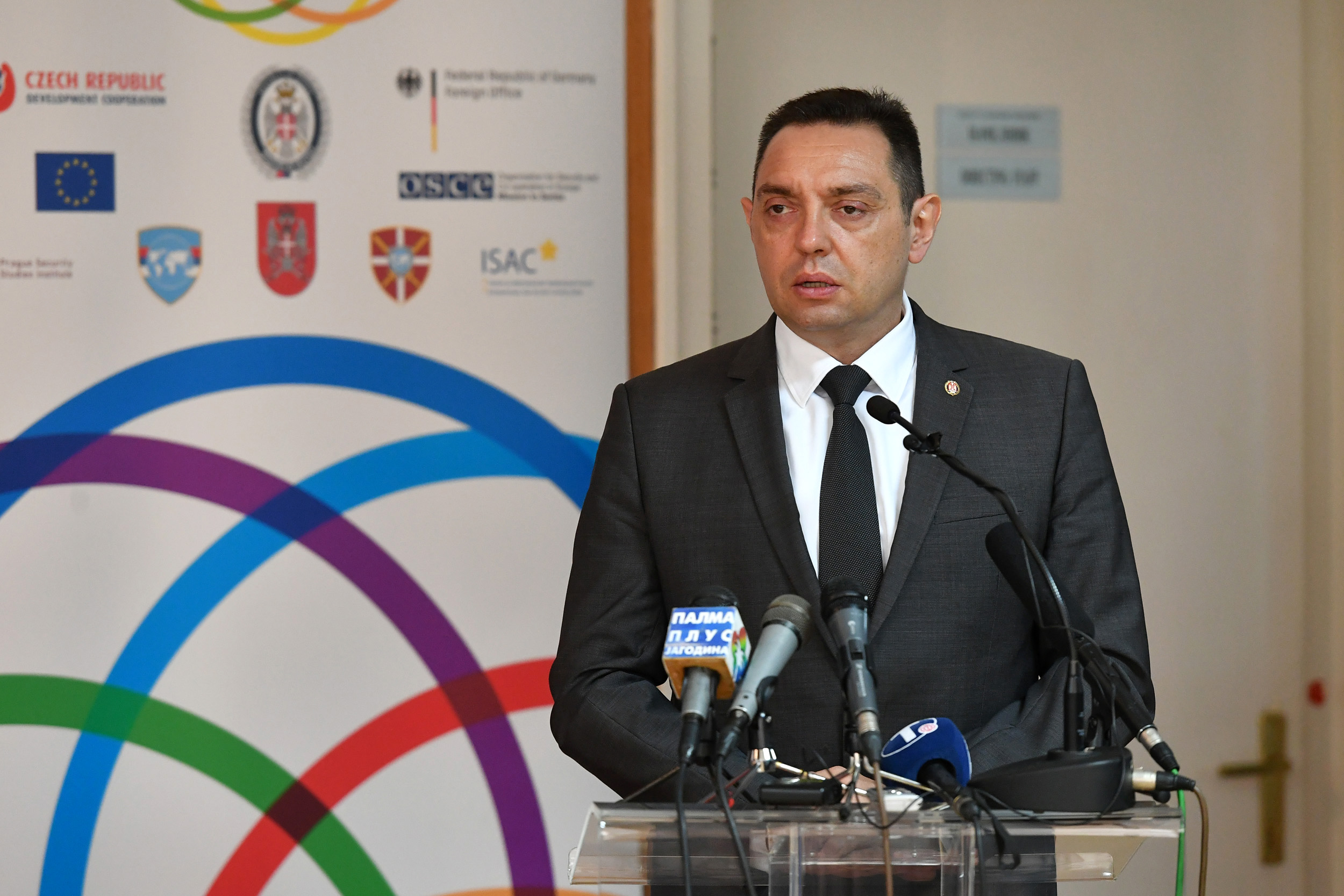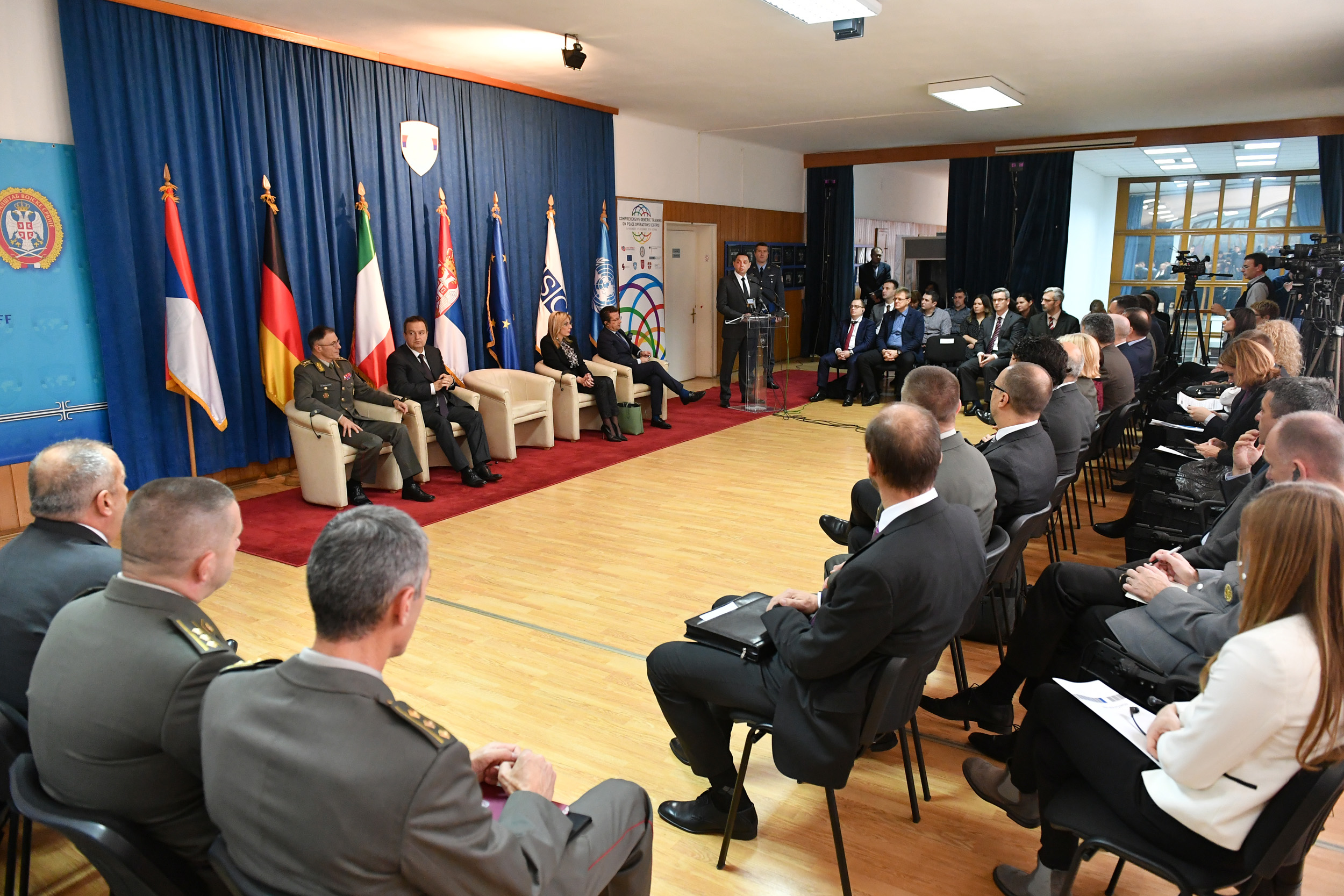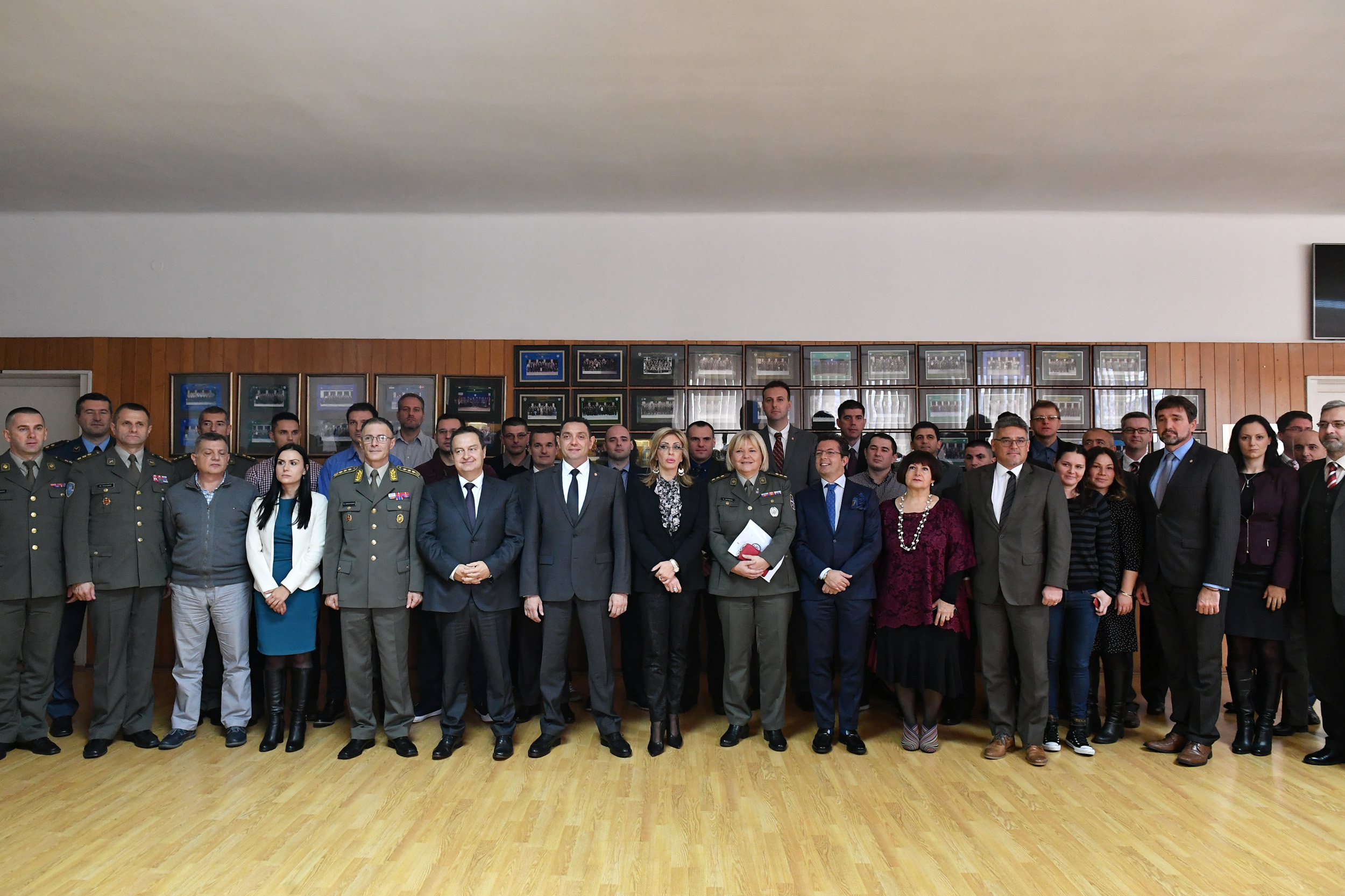26.11.2018.
Minister Vulin: Peacekeeping missions restore people's confidence in people
Minister of Defence Aleksandar Vulin has opened the first Civilian Training Course for the participation in multinational operations at the Peacekeeping Operations Centre in Belgrade, today, in the presence of Minister of Foreign Affairs Ivica Dačić, Minister for European Integration Jadranka Joksimović, Chief of General Staff of the Serbian Armed Forces Lieutenant General Milan Mojsilović and Chief of OSCE Mission to Serbia Ambassador Andrea Orizio.
On that occasion, Minister Vulin emphasized that there are few peoples that know the value of peace as the Serbian people does, because we participated in frequent wars that we did not even ask for or provoked, but they destroyed our country and made life impossible.
 - We know what peace means. Peace is so easy to expel, and so hard to return. That is the importance and value of all of you who have dedicated yourselves to participation in peacekeeping operations, you who have dedicated yourselves to restoring peace where peace has been expelled. Just as we have shown everywhere in the world that a Serbian soldier not only knows how to fight, but he also knows how to keep peace, now we are preparing to show that our civilians can do what their uniformed predecessors did: to keep peace, to restore hope and to restore the faith of people to other people – Minister Vulin said, adding that after every war, buildings, roads and industrial production can be restored, but what is harder than anything is to restore people's confidence in people
- We know what peace means. Peace is so easy to expel, and so hard to return. That is the importance and value of all of you who have dedicated yourselves to participation in peacekeeping operations, you who have dedicated yourselves to restoring peace where peace has been expelled. Just as we have shown everywhere in the world that a Serbian soldier not only knows how to fight, but he also knows how to keep peace, now we are preparing to show that our civilians can do what their uniformed predecessors did: to keep peace, to restore hope and to restore the faith of people to other people – Minister Vulin said, adding that after every war, buildings, roads and industrial production can be restored, but what is harder than anything is to restore people's confidence in peopleAfter every war, the minister of defence said, there are crimes and hatred, fear and insecurity that peace will essentially and really return at one point in time.
- That is precisely what is your virtue and value - to bring faith back to people. To restore faith in them that the world will make sense again. In the world in which we live, in the world that is changing for worse, and in the world that is an increasingly unsafe place, a world full of challenges, there is a lot of room for peacekeeping missions and for those who will cure what those irresponsible and bad did before. In the world that is changing for worse, Serbia wants to be an example of how it is possible to preserve peace and stability and transfer it to others. All our problems or the majority of our problems can be essentially explained by a single sentence – the absence or disregard of international law. Those big and powerful have chosen that the international law is neither predominant nor determinative, and that it is possible to use force, and we have come to the point that the world becomes increasingly unsafe and worse place. The role of peacekeeping missions, regardless of whether they are civil or classic, is to restore confidence in the international law, to restore respect for simple and safe rules that have kept this world long enough away from the war – Minister Vulin emphasized, adding that to the extent to which we respect the international law and the right of every country to define itself, to organize itself and its own life, to that extent we will avoid conflicts.
 Until that time, he said, peacekeeping missions will have to exist as a better part of the international community, coming to difficult and terrible places to cure and help.
Until that time, he said, peacekeeping missions will have to exist as a better part of the international community, coming to difficult and terrible places to cure and help.- Our military, our Government, our ministries have enough knowledge, enough experience, enough opportunities to transfer their knowledge and experience to others and help the world to be a better place – Minister Vulin concluded and wished the participants success in their work.
According to Mr Ivica Dačić, First Deputy Prime Minister, the Civilian Training Course for Multinational Operations is an opportunity to demonstrate the importance that we attach to this activity, which contributes, among other, to an even stronger foreign policy position of Serbia.
- Serbia has been making an active and continued contribution to international security and stability by participating in military and police multinational operations, so that our representatives are currently deployed in five UN-led operations and four EU-led operations, with a total of 279 personnel – the foreign minister said, adding that statesmen and experts in peacekeeping missions and operations continue to praise personnel from the Serbian Armed Forces and from the Ministry of the Interior, emphasizing their high level of training, professionalism and the ability to fulfil even the most complex tasks.
 That is, Dačić said, a confirmation that Serbia has taken an important place both in the UN and in the framework of the European Security and Defence Policy, as a reliable partner, and such an engagement has contributed not only to the strengthened positive image of our country, but also to the implementation of certain strategic aspects of our foreign policy.
That is, Dačić said, a confirmation that Serbia has taken an important place both in the UN and in the framework of the European Security and Defence Policy, as a reliable partner, and such an engagement has contributed not only to the strengthened positive image of our country, but also to the implementation of certain strategic aspects of our foreign policy.- Today we are opening a new and important chapter that will further contribute to the establishing of Serbia as a security exporter and a state that is sincerely committed to such values as peace and cooperation – Dačić said, emphasizing that the participation of civilians in multinational operations is increasingly important and sought after and that he was proud that demanding engagements in the field of our foreign, security and defence policy, which additionally highlights the significance of Serbia’s position on the international stage, are successfully implemented by the institutions of our country with full coordination and understanding.
Minister for European Integration Jadranka Joksimović reminded that this ministry was exactly the one that initiated creation of a normative framework that enabled the participation of civilians in peacekeeping operations. Serbia is a country that gives full contribution in the field of security, remaining consistent with multilateralism.
According to her, Serbia does not expect to receive tasks from the European Union, but makes efforts to secure peace even beyond its borders.
According to Ambassador Andrea Orizio, Head of the OSCE Mission to Serbia, the course that has been opened today is the result of two-year work of Serbian institutions and their partners to illustrate in a right way good inter-ministerial and international cooperation in the field of security. He reminded that the participation in multinational operations is an important task, and that the knowledge of civilian experts is particularly important in the post-conflict period. Inter-ministerial cooperation, he said, is crucial for the success of the project, and in that domain Serbia has shown great results and a clear orientation to a safer future.
Welcoming the participants on behalf of the Peacekeeping Operations Centre, the Course Director and Head of the Training Department, Lieutenant Colonel Goran Topalović pointed out that the Ministry of Defence and the Serbian Armed Forces have extremely developed capacities and rich experience in the selection, equipping, training, deployment, support and redeployment of peacekeepers. That is why, during the two-week course, excellent lecturers will try to make the alumni familiar with the conditions they could find themselves in and teach them how to face difficulties and save their lives, health and dignity in an enemy territory.
The course of civilian training for participation in multinational operations will be held in Belgrade, Kraljevo and South base in Bujanovac from 26th November until 7th December 2018 and will be aimed at establishing of national capacities for the participation of civil structures of the Republic of Serbia in peacekeeping missions of UN, EU and OSCE. During the two-week course, eminent experts from Serbia and instructors from partner countries and certified centres in which civilians are trained for participation in international peacekeeping operations from the Czech Republic, Germany and Italy, as well as international organisations representatives, will train Serbian civilians for their duties in multinational operations.
The course, attended by 20 participants, is organized by the Directorate for European Integration and Project Management of the Ministry of Defence and the Peacekeeping Operations Centre, civilian experts from the state administration bodies - the Ministry of Defence, the Ministry of Foreign Affairs, the Ministry of Public Administration and Local Self-Government, the Ministry of Interior, the Ministry for European Integration, Commissariat for Refugees and Migration and other state institutions.




